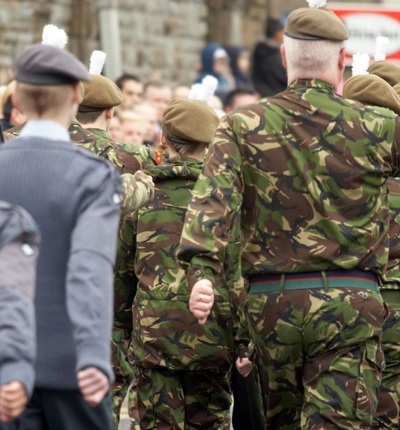
The Military ‘Justice’ System is failing women
Dino Nocivelli and Astrid Parrett consider how the military justice system puts power in the wrong hands and fails to protect victims of sexual offences.
Posted on 09 July 2025
In 2022, research found that more women are leaving the UK Armed Forces than are joining. Many women have reported leaving the service due to facing bullying, sexual harassment, discrimination and lack of accountability. Some 64% of female veterans have reported experiencing bullying, harassment and/or discrimination.
Women who have reported abuse have described a lack of faith in the complaints system. Only 23% of cases (January 2018 to April 2024) in the military justice system secure convictions for sexual assault cases compared to 70% of cases being convicted in the civilian courts.
We believe this figure highlights that the UK Military Justice system is clearly broken.
The Military Justice System vs Civilian Courts
The UK Military has its own justice system. The reasoning for there being a Military Justice System is that the martial courts are able to deal with offences that are distinctive to the military such as being absent without leave or disobeying a command. Furthermore, it ensures that the disciplinary system applies to service personnel wherever they may be serving, even if it is out of the UK.
It is generally expected that grave offences - like rape - committed in the UK would be investigated by the Crown Prosecution Service and prosecuted in the civilian courts. However, as Centre for Military Justice found, the Service Police frequently investigate serious offences.
The service justice system has been described as slow, biased and often ineffective, disproportionately affecting women and minority groups. The Service Justice System has failed to adequately address serious offences like sexual assault. Open Democracy found that from 2015 - 2024, the military police looked into 1,423 rape and sexual assault allegations against women, plus 304 further cases involving male victims.
Serious allegations like sexual assault are often reduced to lesser charges (e.g. battery), allowing commanding officers to handle it internally, bypassing police involvement, which raises the question of whether this is to protect the careers of those accused.
When the allegations do reach proceedings in martial court, judge advocate leads, while a panel of senior officers / warrant officers acts as the decision board. Verdicts are decided by a simple majority, and sentencing is determined collectively by the board and judge advocate.
OpenDemocracy highlighted that these panellists often share damaging beliefs - some have been found using misogynistic language online, including board members defending convicted sexual abusers.
Court martials acquit 77% of accused rapists compared to there being around 30% acquittals in civilian courts. There is clearly a stark imbalance in justice. We believe the martial court system cannot be trusted to handle serious crimes like sexual assault and rape competently.
Further, justice is also denied to these sexual abuse victims in the civil courts. Due to allegations being frequently minimised or dismissed by the internal investigations in the military, a victim’s evidence is weak or absent which means they are even less likely to able to bring legal actions in separate civil claims.
What needs to change
It goes without saying that the culture and attitudes towards women in the military need to change.
It is unlikely that the culture will improve for women if those that commit sexual offences in the military are not held to account.
A zero-tolerance policy on sexual misconduct was introduced in 2022, following the 2021 Defence Sub-Committee Report, which showed 64% of female veterans and 58% of serving women had experienced bullying, harassment or discrimination. However, it has been reported that this policy is poorly implemented and there has been little change. With the current structure of the justice system, victims are likely to face continued resistance in obtaining justice against those who have abused them.
At the least, serious crimes such as sexual assault and rape should be moved out of the military into civilian courts to try and ensure independence and fairness as much as possible. Other organisations have recommended this too but the Ministry of Defence is still resisting transferring such cases to the civilian courts.
This reluctance suggests that victims’ voices are being ignored and the impact of being sexually assaulted is being swept under the carpet.
Not-guilty verdicts result in victims being denied support and thus, even more likely to be left to deal with issues such as poor mental health and substance misuse.
This came to light at an inquest this year into the death of 19-year old soldier Jaysley Beck who took her own life in 2021 after being relentlessly harassed by her line manager and sexually assaulted by another colleague. Her family have recently spoken out about the Army’s failure to take appropriate actions when Jaysley made a complaint against her colleague.
Change to the system should have been made decades ago, and it is now too late for too many women. However, in order to prevent similar deeply tragic results, the Government and the Military need to make these changes in their justice system and stop failing to protect their female personnel.

Dino Nocivelli
Dino is an experienced child sexual abuse claims lawyer. He is also a member of the Association of Child Abuse Lawyers and an ambassador for The Survivors Trust, Kyniska Advocacy, Seen & Heard, and Revival – Wiltshire RASAC.

Astrid Parrett
Astrid is a paralegal working in the abuse team in the human rights department.

Placing art and profit above abuse victims: the lack of action by Netflix in addressing allegations against Neil Gaiman
In a culture that idolises fame, Astrid Parrett and Dino Nocivelli consider how celebrities can routinely get away with saying or doing the wrong thing and this perceived immunity can often extend to serious criminal behaviour.

